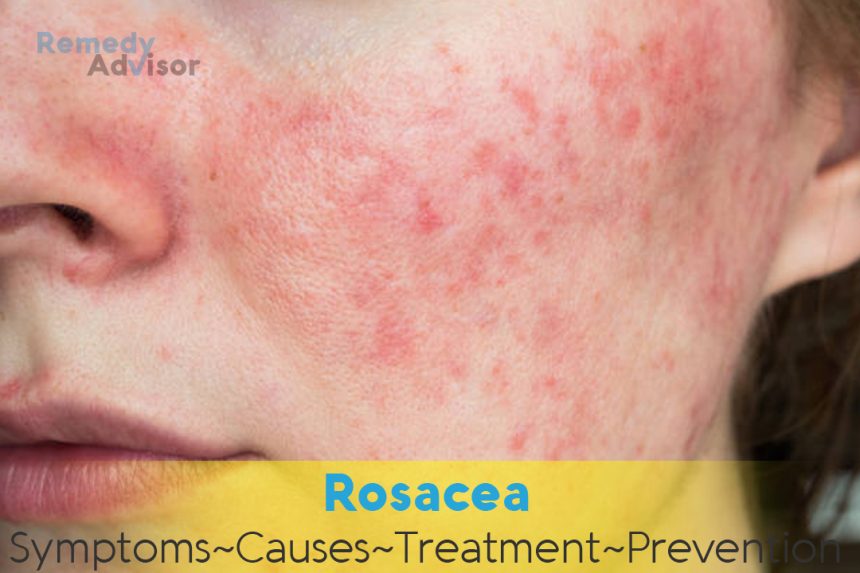What is it
Rosacea (rose-AY-sha) is a chronic inflammation of the skin of the face that causes redness and swelling. Characterized by enlargement of blood vessels in the skin, the condition which affects 13 million Americans typically affects the forehead, chin, and lower half of the nose, usually beginning with redness in the center of the face that gradually widens to cover the cheeks and chin. In time, rosacea leads to the appearance of small spidery blood vessels (telangiectasia) and tiny pimples in and around the reddened area (which is why it was once known as adult acne). In some cases rosacea may be accompanied by oily skin and dandruff.
In more advanced cases, thick red bumps may develop on the lower half of the nose and spread to the cheek. This condition, called rhinophyma, is more common in men than women, with its victims often mistaken for alcoholics, thanks to the comedian WC. Fields, who had rhinophyma and rosacea and regularly referred to his nose bumps as “gin blossoms.” But teetotalers can certainly get rosacea.
Rosacea is sometimes called the curse of the Celts because so many people who develop it are of Irish ancestry. In fact, it can also afflict other ethnic groups. Still, those most Likely to develop rosacea are adults with fair hair and skin, typically women between the ages of 30 and 60. When it strikes men, rosacea is often more severe.
Symptoms
- Areas of the face appear to blush for a few minutes to a few hours.
- A few outbreaks can leave a permanent sunburned appearance.
- Blood vessels in areas with rosacea enlarge and become more visible through the skin.
- Pimples appear in some cases.
- In about half of the cases a burning and gritty sensation is experienced in the eyes.
What causes it
Some experts believe a vascular disorder may be the cause, or that mites, which inhabit facial hairs, may play a role in causing the inflammation. Since rosacea can affect several family: members, researchers think there is a genetic; component to the disease. The actual cause of rosacea is still unknown, but a number of diverse factors can aggravate the condition, including stress, spicy foods, smoking, alcohol, temperature extremes, humidity, exercise, hot drinks, wind, excessive sunlight, and skin products that contain irritating ingredients.
What if you do nothing
Rosacea rarely reverses itself and may last for years, worsening without treatment.
Home remedies
Rosacea can’t be cured, but it can be treated with several medications prescribed by your physician. In addition, the following measures may help.
Keep a trigger diary
One way to help control rosacea is to avoid anything that you think makes your face flush. Keeping a diary of such triggers may help. These might include alcoholic beverages, alcohol applied to the skin, hydrocortisone creams, sun exposure, hot baths, hot or very cold weather, vigorous exercise, heavy lifting, straining on the toilet, chronic cough, menopause, or emotional upset. Hot spices and peppers, hot drinks, chocolate, yogurt, and tomatoes may aggravate rosacea. So can certain drugs, such as niacin in large doses (for lowering cholesterol) and blood pressure medications. Most over-the counter “remedies” aggravate rosacea rather than help it.
Check your cosmetics and medications
Certain medications may dilate blood vessels and worsen rosacea. Instead of using oil-based products, switch to less irritating water-based cosmetics.
Reduce stress in your life
Do your best not to suppress anger, fear, or other strong emotions.
Avoid rubbing your face
This can irritate your skin.
Switch to an electric shaver
Razor blades can irritate the skin. Avoid aftershave lotions containing alcohol, menthol, witch hazel, or peppermint.
Apply cold compress
Soak a cloth in ice-cold water and rub it to the flushed parts of your face for about 10 minutes. This will help constrict dilated blood vessels and slow down the inflammatory process.
Use sunscreen
If you must be in the sun, this will help protect your skin.
Avoid extremes of temperature
When it’s too hot or too cold, rosacea symptoms can intensify.
Prevention
There are no specific preventive measures for rosacea, but you can help control it by avoiding anything that makes your face flush.







